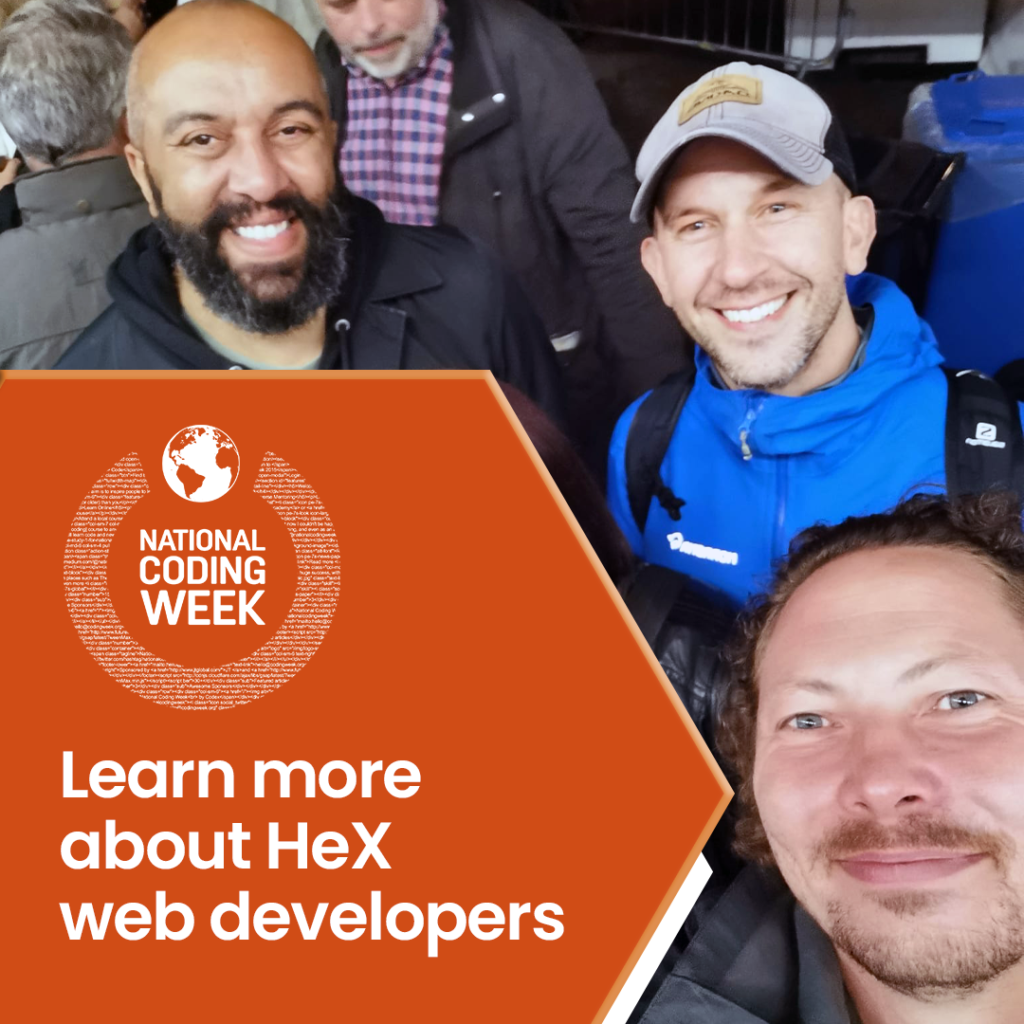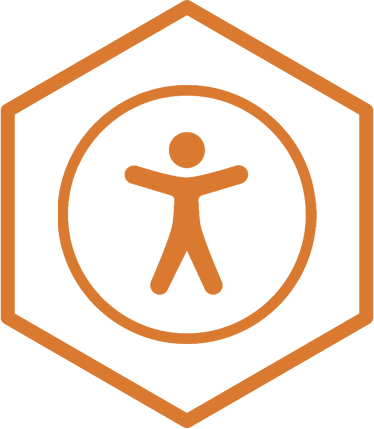It’s National Coding Week. A week all about learning new digital skills and encouraging people to embrace learning how to code and ways to ensure professionals are doing so in an accessible way.
For National Coding Week, we caught up with a few of our accessibility experts to see what drew them towards working in the tech field and encourage other aspiring coders to take up a career in this important and exciting industry.
What are your roles within the HeX team?

James Hall: I’m the Creative Director at HeX Productions. I manage the team, develop accessible websites, provide training sessions, and support organisations across the globe to become accessible.
Tom Miller: I’m HeX’s Front-end Developer, responsible for looking after our websites across the board.
Hérick Moukodi: My role is a Front-end Developer for HeX, building and overseeing our clients websites.
Why did you get into coding?
James: I’ve been into all things web as far back as I can remember. I built my first website at the age of 13 or 14; this is when horlix.com was born. I used Microsoft Front Page, which is now regarded as one of the worst programs in the world! My passion for web development followed into college, where I became a Student Web Developer. After that, I went on to study E-commerce technology at university.
Tom: Web development has always interested me, but it hasn’t always been my specialism. I started out in the editorial industry, managing a team of picture editors. However, in my spare time, I regularly played around with WordPress, assisting with family members’ sites and creating websites for friends.
Hérick Moukodi: When I was at university, doing a degree in Psychology, I did a module in Human Computer Interaction. It covered artificial intelligence, where we learned about expert systems and neural nets, and ergonomics; the usability of computer hardware and software. User interfaces tended to be rather clunky, so it got me thinking about how they could be more usable. It also me got interested in programming and I taught myself C (not easy!).
How did you get into a career as a web developer?
James: After university, I worked for a year with the Tech Guys (now known as Know How) to get web experience. Then opportunities arose working with public sector organisations, such as Broxtowe Borough Council and Gedling Borough Council. These taught me the ins and outs of the industry. At the same time, I was freelancing, which enabled me to reduce my hours and get to work creating my own startup business – HeX. Since, HeX has flourished into an award-winning company with a global reach.
Tom: After enjoying working alongside a couple of developers, I decided to take the plunge and take a sabbatical from work to take part in a Javascript Bootcamp. This led me to become a graduate software engineer. However, I soon realised that working on the backend of websites wasn’t for me, and that’s when I discovered my passion for Front-end development work.
Hérick Moukodi: My web development journey started over 20 years ago, when I worked in a college library, and I volunteered to update their intranet pages. This was in the pre-WYSIWYG days, so I taught myself to hand code HTML. I really enjoyed it, so when the opportunity to manage the college’s whole web output arose, I grabbed it.
How could someone in education enhance their experience?

James: Whilst I was a Student Web Developer I took the time to look after the ‘student zone’ at college and built that site up. At university, my dissertation involved turning an offline business into an online one, in which I built an online coffee bean ordering system for a local coffee shop. It’s projects like these where you can gain new skills and can refer to them on your CV.
It’s also important to secure work experience within the industry you are trying to go into, it’ll broaden your experience and give you real-life insight into that career. HeX works closely with universities, colleges, and schools to give young people the opportunity to take away accessibility knowledge to help in shaping the digital future. So, bear us in mind if you’re looking for work experience.
What advice would you give to future developers?
“Things are always moving fast in development, so you’ve got to be able to learn quickly.”
Tom: There isn’t a day goes by where you don’t learn something new in web development. You’ve got to have patience and try to be methodical in the way that you work.
Quite often, things don’t always work the first time, so being able to deal with these frustrations is important. If you’re good at problem solving, you’ll thrive in this field.
Why is accessibility important in coding?

Web accessibility is when websites, apps, and digital tech are built so that people with disabilities or users of assistive technology can use them. If accessibility isn’t taken into consideration or isn’t designed in the correct way, it can create barriers that exclude people and even stop them from using a website altogether.
It’s everyone’s responsibility to design with the user in mind, especially so for web developers. That’s from the wireframing stage, right through the development process, and even within the site’s content.
There are Web Content Accessibility Guidelines (WCAG) to guide you through how to make a site accessible and four main principles to consider when building an accessible website.
Learn what good digital accessibility means to our web development team
Our developers share insights into the need for accessible platforms and give advice to fellow web developers on how to make their platforms inclusive:
Our top 5 tips for people to get into coding:
- Get Googling – there are lots of online tools and software out there now to be able to self-teach yourself code. From free resources for young people, such as Code Club which offers free step-by-step guides, to in-depth YouTube tutorials.
- If self-teaching doesn’t necessarily work for you, enrol on a course to show you the way. Take a look at local colleges or universities for courses.
- Coding can be a bit like learning a new foreign language, so you’ll need to choose the code that you want to learn and see what suits you. Here are some you can Google Java, HTML, CSS, and Python.
- Don’t be afraid to ask for help, it’s the best way to learn. Upskill yourself from learning tips and tricks from the experts.
- Have the confidence to give it a go. Try writing your own code and sure you’ll surprise yourself with what you can achieve!
